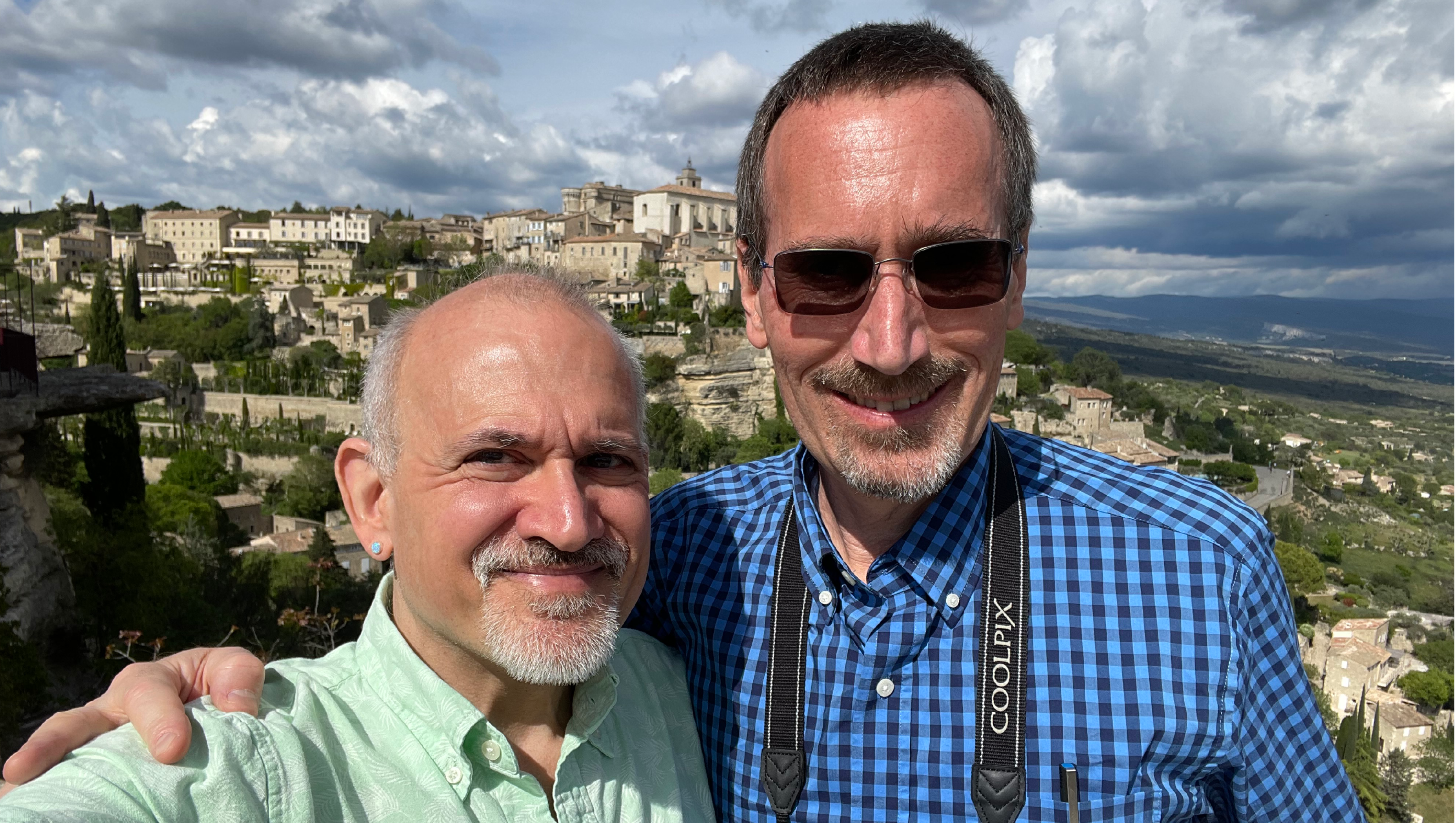
By Amanda Malone
John Dumas, who graduated from UC Irvine with a B.A. in English in 1994, and husband James Nowick, Distinguished Professor of chemistry at UCI, share a profound belief in the university’s longevity and impact across time. Dumas and Nowick are an essential part of this longevity, as their generous legacy gifts to the Departments of English and Chemistry will enable UCI’s lasting impact on students and the broader community for years to come. A legacy gift, also called a planned gift, indicates a donor’s intention to contribute to an organization beyond their lifetime through a formal estate planning designation.
Dumas and Nowick’s legacy gift has a special connection to his expertise in medieval studies, honed during Dumas’s time on campus. They intend through their gift to fund an endowed chair in medieval studies, which will create a named faculty position for a new faculty member who will contribute to the curriculum of the department and will receive funding for their research and other scholarly activities.
Knights’ tales: Dumas and Nowick’s journey to UC Irvine
Dumas and Nowick, who recently celebrated their 39th anniversary, arrived in California in 1991 from Dumas’s native Massachusetts, where he began his education at UMass Boston and Nowick completed his Ph.D. at MIT. Nowick started his assistant professorship at UCI, and Dumas, with Nowick’s encouragement, continued his studies after several years in his professional career, enrolling at UCI as a transfer student.
Dumas’s interest in medieval studies began early in life as an avid reader of Tolkien. At UCI, he found a home in the English Department, and studied with some of the School of Humanities’ most influential professors in various fields, including Professor Emeritus of English and medievalist Stephen A. Barney, the late Richard Kroll, Professor Emerita Linda Georginna and Professor of Italian James Chiampi. Today, Dumas’s knowledge of medieval literature is broad and deep. His familiarity with Old English pronunciation captures the fresh humor of these texts, often lost in modern speech. He can speak on William Langland’s Piers Plowman, the debate about Shakespeare authorship and German medieval tales with equal enthusiasm and fluency.
As a first generation student, Dumas’s experience at UCI is one shared by many of our students today. “John – in a way – is exactly what UCI is,” Nowick says. As of 2024, almost 50 percent of UCI undergraduate degrees are earned by first-gen students. “The campus celebrates first-gen people at all levels, including our faculty, many of whom proudly display 'first gen' in their offices because this is also part of their experience,” Nowick adds.
A seat at the round table: a legacy gift for future medievalists
Dumas’s gift upon his and his husband’s passing will enable future generations of UCI students and scholars to engage in a field that connects past and present and that fosters a broad and diverse range of scholarship spanning a thousand years of history across Europe, the Middle East and North Africa.
This is a point Elizabeth Allen, professor and chair of the English Department who specializes in medieval literature, makes in expressing gratitude for the couple’s enthusiasm for the field and Dumas’s generous gift. “This endowment will ensure not only that John’s experience as an undergraduate here and his lively intellectual life since then will be honored and remembered, but also that medieval literature will continue to have a place in the Department of English and in the School [of Humanities],” she says. “In a time of great pressure on the University, including the humanities, it is heartening that John has such a clear-eyed commitment to the study of the past.”
Rebecca Davis, associate professor of English and medievalist at UCI, affirms how important Dumas’s gift is to maintaining an ongoing tradition of teaching medieval literature at UCI, introducing students to the rich history of the English language and to new roles and forms of writing. For Davis, the gift means students will “continue to be surprised by the interaction of languages – Celtic, Norse, Latin, French and Old and Middle English – in medieval England, and by the diversity of cultural interactions sparked by travel, war, trade and intellectual exchange throughout this period. Best of all, they’ll get to read narratives that remain relevant to our contemporary political and ethical concerns.”
Both Allen and Davis emphasize medieval studies as a field that not only connects past and present, local and global, but one that creates contemporary communities at UCI and beyond as sites of dynamic intellectual exchange.
Medieval studies illuminates our understanding of our own times
Dumas’s understanding of medieval studies speaks to its utility in a tense political climate that rests on competing understandings of history. “People have this sanitized picture of the past,” he observes, and yet medieval texts offer a kind of provocative fun – “There’s so much humor” – as well as room to read history against the grain. If history is often written by the winners, the critical reexamination of these texts allows for a more nuanced picture. “One of the things universities are really good at is history,” he says. “History is revisionist in its very nature.”
The couple express an uplifting optimism about the role of universities in a challenging time. “Universities have survived many times of political turbulence,” Nowick says, “I think that UCI and the UC system have a long and bright future.” Dumas and Nowick play an indispensable role in UCI’s bright future through their contributions as scholars and the shared goal of their legacy gifts. For Nowick, because universities have longevity, “it’s possible to make an impact across time. Planned giving can be a very effective way to do that beyond one’s lifetime.”
Interested in reading more from the School of Humanities? Sign up for our monthly newsletter.
